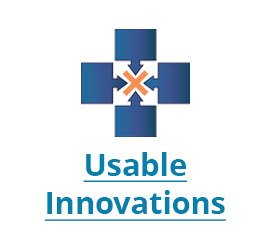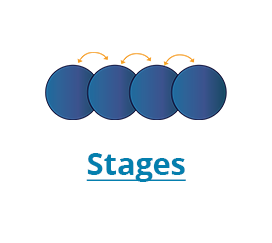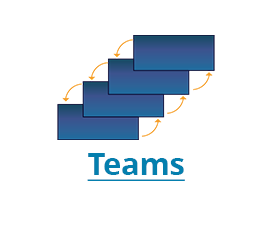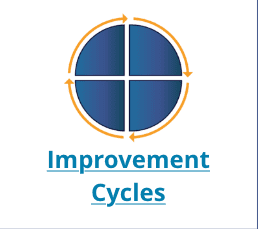Start Here
Active Implementation Learner Pathways
Learning pathways in implementation science serve as structured routes for individuals to effectively acquire the necessary knowledge, skills, and competencies to translate evidence-based interventions into real-world settings.
Activity: Getting started with Implementation Drivers
How could you leverage the Implementation Drivers framework in your work? Discuss these questions with your team and/or to record your responses. Thinking about a specific instructional practice or behavioral innovation may make this exercise meaningful for you.
Drivers Ed Short Series
This short series of lessons provides a quick booster on each Implementation Driver, then an opportunity to practice and apply the driver concepts. The resource provides a one stop shop for your basic Implementation Driver needs.
Handout: Implementation Drivers One-Pager
Implementation Drivers are the key components of capacity that enable the success of innovations in practice. Implementation Drivers assure development of relevant competencies, necessary organization supports, and engaged leadership.
Implementation Drivers Overview (Module 2)
Formally known as “modules” on the AI Hub, we have condensed the information into document overviews. As you begin your journey, take a moment to read about Implementation Drivers.
Dive Deeper: Read
A Tale of Two States: Alignment and cohesion to close long-standing disparities in student outcomes
Some organizations may find they do not have the capacity to transform the entire system simultaneously. This brief provides two different examples of a State Education Agency's path to systemic change, and the facilitators and barriers to consider.
Accomplishing Effective and Durable Change to Support Improved Student Outcomes
This white paper, released by SISEP and the Kentucky Department of Education, shares Kentucky's journey and learnings from using implementation science to improve student outcomes.
Blog: What’s In Your Toolkit? 4 Essential Mapping Tools to Drive Implementation Quality and Accelerate Change
Read on to learn how mapping tools can be used to support change with purpose and efficiency during the implementation process.
Brief: Transforming a Regional Education Agency through MTSS Implementation
Context matters in implementation. The Lenawee ISD in Michigan, navigated implementation through major changes in their school districts’ administration and the COVID-19 pandemic. Learn more about their impact.
Coaching Practice Profile
Practice Profiles provide structure to the process of making a practice teachable, learnable, and assessable.
Decision Support Data Systems – Examples from Practice
A Decision Support Data System (DSDS) is a system for identifying, collecting, and analyzing data that are useful to the staff and leadership of the implementing agencies. The handout provides two examples, one from the Kentucky Department of Education and another from the Wisconsin Department of Public Instruction.
Drivers Tip Sheets
Drivers Tip Sheet: Implementation Infrastructure
Handout: Capacity Building Resources
For more information on capacity building activities, please see these learning resources.
Handout: Fidelity Q & A
As a follow-up to the "What is Fidelity" Brief and Webinar, the SISEP Center compiled several questions from the field regarding fidelity. This document contains your questions and the SISEP Team Responses along with additional resources.
Handout: Implementation Drivers One-Pager
Implementation Drivers are the key components of capacity that enable the success of innovations in practice. Implementation Drivers assure development of relevant competencies, necessary organization supports, and engaged leadership.
Implementation Champions as a Strategy to Build Capacity
Identifying, supporting, and engaging implementation champions has been shown to increase the likelihood that programs and practices are implemented as intended and achieve their intended outcomes. Anyone who engages in implementation work, regardless of their position, can serve as a champion.
Implementation Drivers Overview (Module 2)
Formally known as “modules” on the AI Hub, we have condensed the information into document overviews. As you begin your journey, take a moment to read about Implementation Drivers.
Navigating the Implementation Cs: Back to School Reminders and Tips
SISEP Blog: Navigating the Implementation Cs: Back to School Reminders and Tips
Observation Tool for Instructional Supports and Systems
The Observation Tool for Instructional Supports and Systems (OTISS) aims to assess the quality of systems and supports available to help teachers use best instructional practices. It is to be used when frameworks, approaches, and instructional practices do not develop a specific fidelity measure.
Observational Tool for Instructional Supports and Systems: Empowering Teachers as Instructional Leaders
The OTISS was developed in response to the need for a research-based observation measure of instruction that could be used with any practice, program, curriculum, or grade level. It was designed specifically to use when the selected evidence-based practice or program does not have a measure of fidelity or integrity.
Scaling-Up Brief 2: Intensive Technical Assistance
Technical Assistance (TA) is designed to build the capacity of individuals and organizations to achieve desired outcomes. When the scale or depth of change is more extensive, Basic TA efforts need to be supplemented with more Intensive Technical Assistance.
The ABCs of Building Organizational Capacity
SISEP Blog: The ABCs of Building Organizational Capacity
Tips for Remote Administration of Capacity Assessments
A tip sheet for administering capacity assessments with remote teams, developed by Ellen Nacik and John Gimpl, State Implementation Specialists with the Minnesota Department of Education.
What is Fidelity?
Fidelity is a complex concept and utilizing fidelity measurements and data at all levels of the teaming cascade is needed to support staff with implementation. This brief provides a deep dive into this concept, with real-world examples.
Dive Deeper: Watch
Lesson: Coaching Service Delivery Plan
Coaching not only expands the knowledge and skills taught in training, but also builds competence and confidence in delivering the innovation.
Lesson: Coaching System Development Worksheet
This lesson provides a quick overview of the Coaching System Development Worksheet along with research and rationales supporting the use of coaching to build your implementation capacity.
Lesson: Creating a Training Plan Template
This lesson provides a quick overview of the Training Plan Template, a planning tool designed to help guide your Team's planning process in developing a training program.
NIRN-SISEP Data System User Video Tutorials
A collection of short video tutorials walking users through how to use the NIRN-SISEP Data System to collect and display their capacity assessment data.
Voices from the Field Video Series (Competency Drivers)
Voices from the Field Video Series: Competency Drivers
Voices from the Field Video Series (Integrated & Compensatory)
Voices from the Field Video Series: Integrated and Compensatory
Voices from the Field Video Series (Intro to Implementation Drivers)
Voices from the Field Video Series: Intro to Implementation Drivers
Voices from the Field Video Series (Leadership)
Voices from the Field Video Series: Leadership
Voices from the Field Video Series (Organization Drivers)
Voices from the Field Video Series: Organization Drivers
Dive Deeper: Listen
Implementation Science for Educators Podcast (Competency Drivers)
Implementation Science for Educators Podcast: Competency Drivers
Implementation Science for Educators Podcast (Fidelity)
Implementation Science for Educators Podcast: Fidelity
Implementation Science for Educators Podcast (Leadership)
Implementation Science for Educators Podcast: Leadership
SWIFT Unscripted Podcast – Implementation Drivers as the Engine for Change
SWIFT Unscripted invited Caryn Ward from NIRN to provide an insightful interview on Implementation Drivers and their role in school transformation.
Dive Deeper: Reflect
Activity: Coaching For All
As you are working on building coaching in your team or organization, read the article. Then, as an individual or with your team, respond to the questions.
Activity: Competency Driver Mapping and Action Planning
Map the levels of quality and effort being applied to Competency Drivers for a current program or innovation. This activity will help you with action planning as you zero in on Drivers that can benefit from more effort and/or attention.
Activity: Designing a Fidelity Assessment by Identifying Challenges and Strategies
Implementing a fidelity assessment often poses several challenges for implementation teams. In this activity we provide an initial four-step approach for identifying, categorizing, and discussing challenges, then completing action planning.
Activity: Developing a Fidelity Assessment
Has your team identified the core components of your intervention or innovation? Has your team clearly
defined or operationalized them? If YES, use the Fidelity Assessment Brainstorming Worksheet (included), to complete this activity individually or as a team.
Activity: Evidence-based Practice Drive Around
Jot down different EBPs/EIIs that you have experienced, participated in, or led, and pick one of those initiatives that have been in place the longest. Then, drive around the Implementation Drivers diagram and reflect on the questions provided.
Activity: Getting started with Implementation Drivers
How could you leverage the Implementation Drivers framework in your work? Discuss these questions with your team and/or to record your responses. Thinking about a specific instructional practice or behavioral innovation may make this exercise meaningful for you.
Activity: Implementation Drivers Elevator Speech
Using content from the Implementation Drivers Overview and the Implementation Drivers diagram, try summarizing Implementation Drivers and their components in a few short sentences.
Activity: Locus of Responsibility
To what degree do you have control and responsibility over Implementation Driver resources, personnel, or processes? This activity will help you quickly assess locus of responsibility in your system.
Activity: Reflection on Selection
Selection of staff, from an Active Implementation perspective, is different from selection as usual in two critical ways. Review the two distinctions, and then try to apply the two concepts in your setting or to your initiative.
SWIFT Unscripted Podcast – Implementation Drivers as the Engine for Change
SWIFT Unscripted invited Caryn Ward from NIRN to provide an insightful interview on Implementation Drivers and their role in school transformation.
Tool: Developing a Training Plan
The Training Plan Template is designed to help guide your team's planning process in developing a training program. This tool can be used to guide discussions around rationale, core components, knowledge, skills, outcomes and assessment.
Apply
Coaching Behavior Interactive Lesson
In this interactive lesson, you will learn to deliver effective and efficient prompting, performance feedback, and scaffolding.
Coaching Overview Interactive Lesson
This interactive lesson introduces a research-based approach to the coaching process and its essential components.
Continuum of Coaching Supports Interactive Lesson
Coaching targets four general phases of learning. In this interactive lesson, learn about those phases and how to use data to identify your recipient's current learning phase so that you can use your coaching supports wisely.
Cultivating Leadership Interactive Lesson
After completing this lesson on Cultivating Leaders/Champions and the companion resources, you will be able to explain importance of leadership to implementation efforts, identify key implementation champion activities, and utilize the Champion Engagement Tool.
District Capacity Assessment (DCA)
The DCA is an action assessment designed to help educational district leaders and staff better align resources with intended outcomes and develop action plans to support the use of effective innovations. Both the training and tool are available online.
Drivers Ed Short Series
This short series of lessons provides a quick booster on each Implementation Driver, then an opportunity to practice and apply the driver concepts. The resource provides a one stop shop for your basic Implementation Driver needs.
Look Fors: General Coaching
This tool captures research-based behaviors, practices, and products to inform supports for coaching of coaching.
Look Fors: Mini Lesson or Training Event
This observation tool captures facilitation skills of team members during mini lessons and knowledge building sessions.
Look Fors: Targeted Coaching
This tool captures research-based behaviors, practices, and products to inform supports for coaching of targeted coaching.
PBIS School-wide Evaluation Tool
In this example of a fidelity assessment, items are designed to detect the presence and strength of each PBIS core feature in a school environment. Data source may be a product, interview, or observation. These ways of assessing fidelity are summarized in the handout.
Regional Capacity Assessment (RCA)
The Regional Capacity Assessment (RCA) was developed to assist regional education agencies in their efforts to effectively support districts in their use of practices supported by evidence or effective innovations. (v2.1)
State Capacity Assessment (SCA)
The primary purpose of the State Capacity Assessment (SCA) is to assist state agency, regional education agencies, and school districts implement effective innovations that benefit students. (v26)
Strategic Analysis of the Implementation Drivers Worksheet
This planning tool assists Implementation Teams in exploring Implementation Drivers (competency, organizational and leadership), including Driver functions and accountability, as well as how each can be improved to better support implementation.
Tool: Observation Tool for Instructional Supports and Systems (OTISS)
The Observational Tool for Instructional Supports and Systems (OTISS) aims to assess the quality of systems and supports available to help teachers use best practices for instruction. It can be used when frameworks, approaches, and instructional practices do not have a specific fidelity measure developed.
Tool: Champion Identification & Reflection
How do we identify potential champions on a team and engage them in activities and reflective practices? Utilize this Engagement Tool to complete the four-step process of identification and reflection for champions.
Tool: Coaching Action Plan
This action plan provides coaches with a tool to set goals with coaching recipients and develop plans to achieve those goals.
Tool: Coaching Service Delivery Plan Template
This template provides the basis for developing a Coaching Service Delivery Plan. The Coaching Service Delivery Plan is a proactive approach to purposeful and supportive coaching.
Tool: Coaching System Development Worksheet
The Coaching System Development Worksheet can be used to initiate those early discussions about the importance of coaching and the facilitative supports administrators need to consider to ensure a systemic commitment to coaching.
Tool: Developing a Training Plan
The Training Plan Template is designed to help guide your team's planning process in developing a training program. This tool can be used to guide discussions around rationale, core components, knowledge, skills, outcomes and assessment.
Tool: Drivers Best Practices Assessment (DBPA)
The purpose of the Drivers Best Practices Assessment (DBPA) is to assist organizations in assessing their current supports and resources for quality use of selected programs or practices.
Tool: Implementation Drivers Action Plan
Action planning around the Implementation Drivers is a vital and ongoing responsibility of Implementation Teams. This planning tool is designed to help your teams in the action planning process.
Tool: Process for Addressing Implementation Barriers
Capacity assessments refer to having an internal process for addressing implementation barriers. This document was created as a guide and example for implementation teams in the process of creating their own contextualized process.
Tool: Root Cause Analysis: Understanding a Community Need
A root cause analysis is a valuable process for identifying the underlying causes of a problem or issue. It helps teams understand why specific outcomes could occur and allows teams to delve deep into the factors contributing to those outcomes. This document contains guidance on conducting a root cause analysis with a team. It provides step-by-step actions and an overview of potential tools for the team.
Tool: TA Partnership Mapping & Alignment
The purpose of this tool is to help identify points of intersection and alignment among various partners providing technical assistance to an organization/agency (e.g., State Education Agency, Local Education Agency).
Tool: Training Plan Template
The Training Plan Template is designed to help guide your team's planning process in developing a training program. This tool can be used to guide discussions around rationale, core components, knowledge, skills, outcomes, and assessment.





